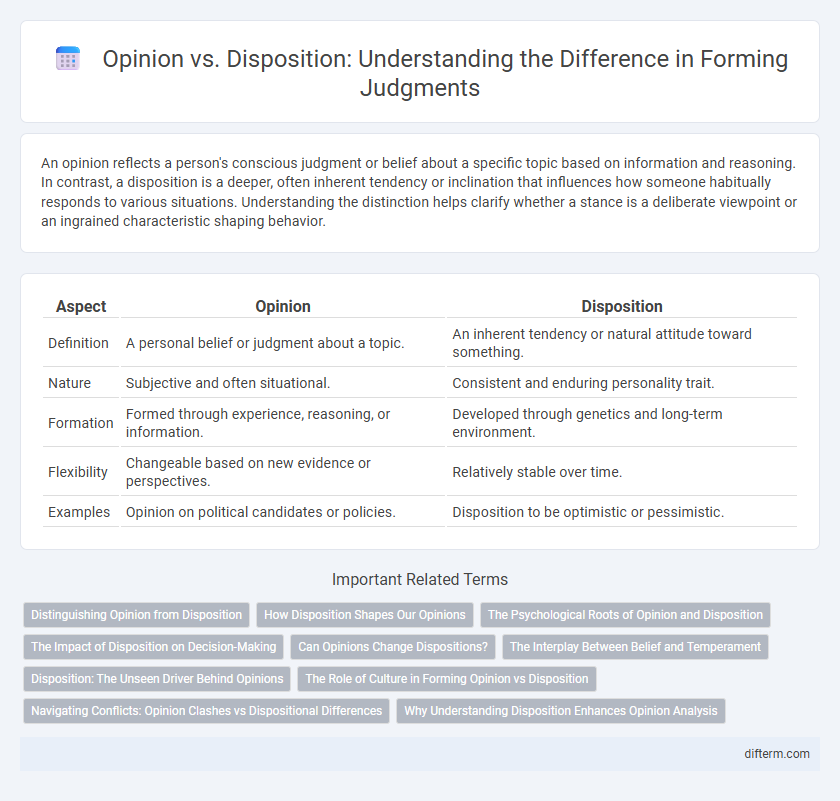An opinion reflects a person's conscious judgment or belief about a specific topic based on information and reasoning. In contrast, a disposition is a deeper, often inherent tendency or inclination that influences how someone habitually responds to various situations. Understanding the distinction helps clarify whether a stance is a deliberate viewpoint or an ingrained characteristic shaping behavior.
Table of Comparison
| Aspect | Opinion | Disposition |
|---|---|---|
| Definition | A personal belief or judgment about a topic. | An inherent tendency or natural attitude toward something. |
| Nature | Subjective and often situational. | Consistent and enduring personality trait. |
| Formation | Formed through experience, reasoning, or information. | Developed through genetics and long-term environment. |
| Flexibility | Changeable based on new evidence or perspectives. | Relatively stable over time. |
| Examples | Opinion on political candidates or policies. | Disposition to be optimistic or pessimistic. |
Distinguishing Opinion from Disposition
Opinion reflects a deliberate judgment formed based on evidence and reasoning, whereas disposition refers to an inherent tendency or natural inclination toward certain attitudes or behaviors. Opinions are subject to change through new information and critical thinking, while dispositions are more stable traits rooted in personality. Distinguishing between the two aids in understanding human behavior and the dynamics of belief formation.
How Disposition Shapes Our Opinions
Disposition profoundly influences opinions by filtering experiences through inherent attitudes, emotional tendencies, and personality traits. This internal lens prioritizes certain information, shaping judgments and reinforcing consistent viewpoints over time. Understanding the dynamic between disposition and opinion reveals why individuals differ in perspectives despite encountering similar facts.
The Psychological Roots of Opinion and Disposition
Opinions are cognitive judgments shaped by individual beliefs and experiences, whereas dispositions are underlying psychological tendencies influencing behavior and emotional responses. The psychological roots of opinion involve conscious evaluation and reasoning processes, while dispositions stem from deeper, often unconscious, affective and personality traits. Understanding these roots clarifies how temporary opinions can contrast with stable dispositions in guiding human actions.
The Impact of Disposition on Decision-Making
Disposition significantly influences decision-making by shaping an individual's inherent tendencies and reactions to situations, often guiding choices more than explicit opinions. Research reveals that people with optimistic dispositions consistently make more risk-tolerant and creative decisions, reflecting an internal bias beyond their stated beliefs. Understanding this impact allows for improved prediction of behavior in complex scenarios and enhances strategies in leadership and behavioral economics.
Can Opinions Change Dispositions?
Opinions can influence dispositions but do not always lead to their change, as dispositions are deeply rooted traits shaped by long-term experiences and values. While a new opinion may prompt reflection or reconsideration, altering a disposition often requires sustained cognitive and emotional engagement. Research in psychology suggests that repeated exposure to differing viewpoints combined with personal relevance increases the likelihood of modifying underlying dispositions.
The Interplay Between Belief and Temperament
Opinions arise from cognitive evaluations and are shaped by individual beliefs, while dispositions reflect enduring temperament traits influencing emotional responses. The interplay between belief and temperament creates a dynamic framework where opinions may shift depending on underlying emotional tendencies. Understanding this interaction highlights how stable dispositions modulate the formation and expression of subjective viewpoints.
Disposition: The Unseen Driver Behind Opinions
Disposition shapes opinions by deeply influencing individual perceptions and emotional responses, often operating beneath conscious awareness. Unlike transient opinions that fluctuate with information, dispositions form stable, underlying attitudes rooted in personality and experience. Understanding disposition reveals the foundational drivers behind why people hold certain opinions persistently and predictably.
The Role of Culture in Forming Opinion vs Disposition
Culture profoundly shapes opinions by influencing the values, beliefs, and information individuals prioritize, leading to diverse perspectives across societies. Dispositions, while also culturally informed, reflect deeper, more stable tendencies shaped by long-term socialization and shared cultural norms. Understanding the distinction between opinion and disposition highlights how culture molds transient judgments versus enduring behavioral inclinations.
Navigating Conflicts: Opinion Clashes vs Dispositional Differences
Opinion clashes often arise from differing beliefs or judgments on specific issues, requiring open dialogue for resolution. Dispositional differences, rooted in inherent personality traits, demand empathy and adaptability to manage interpersonal conflicts effectively. Navigating conflicts successfully involves recognizing whether the tension stems from opinion divergence or deeper dispositional contrasts.
Why Understanding Disposition Enhances Opinion Analysis
Understanding disposition deepens opinion analysis by revealing the underlying attitudes and emotional tendencies that shape individual viewpoints. Disposition offers insights into cognitive biases and motivational factors influencing how opinions are formed and expressed, enabling a more nuanced interpretation of public sentiment. Analyzing disposition alongside opinion allows for more accurate predictions of behavior and responses in social and political contexts.
opinion vs disposition Infographic

 difterm.com
difterm.com